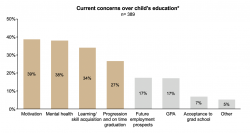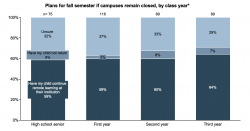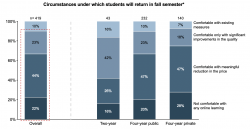Behind the scenes of Otterbein University’s partnership with Antioch University
June 10, 2025 BlogWe’re excited to launch Tyton Partners’ new interview series, Five for the Future: Spotlight on Transformative Institutional Partnerships….
While the severity of this crisis cannot be underestimated, we are inspired by how organizations are shifting their stance from “managing through” to “managing out of” the crisis. In that spirit, we have three items to highlight in this week’s newsletter:
Panelists will include:
Pulse Survey: Parent Mindset About Their Student’s Experience
A Tyton Partners survey of parents of current and would be college students reveals a deep concern about current distance learning measures, pointing to a potentially meaningful risk to tuition revenue in the 2020-2021 school year if students are not welcomed back onto campus. The survey indicates broad misgivings about the quality of the average remote learning experience and a clear frustration with the gap between the on-campus experience for which they and their students are paying– particularly at private, four-year colleges – and their students’ present reality. Parents have a poor opinion of the systems currently in place and appear to judge instructors’ competence with the new format harshly, along with what is perceived to be their inadequate availability and level of interaction with students. Without meaningful improvements in the quality of remote learning, or a meaningful reduction in price, as many as 40% of students could choose not to matriculate this fall. This survey was conducted online between April 10-14, targeted to parents of enrolled college students and college-bound high school seniors. For more detail about the sample and approach, download the summary here.
Parents Note Concerns about their Child’s Well-being, Continued Learning and Progression
For parents that have currently enrolled college students engaged in remote learning, the most frequently cited concerns are about their student’s maintaining mental health and engagement (36%) and motivation and enthusiasm for their studies (36%). Learning and skill acquisition (32%) is the second most-cited area of concern. And progression via maintenance of credit and pace to graduation is the third biggest broad area of concern (27%).

Current Remote and Online Learning Experiences don’t Measure up to Parent Expectations
In terms of satisfaction, parents are ambivalent about their students’ remote learning experience, with an average satisfaction score of 5.6 out of 10. Many concerns center on how poorly the online format fits their child’s needs and particular program of study, the lack of faculty competence with the new modality, and the lack of peer and faculty interaction that is at the core of the traditional on-campus experience that many of these parents and their children had originally opted into. This concern is most pronounced for parents of students at private institutions.
Parents are Uncertain about Fall Enrollment
Over 40% of parents report that they are either uncertain or would not send their child to school for the fall semester in a remote-learning scenario. Among parents of first, second, and third year students, 6% say they would not support their child’s return to school in a remote-learning format. Among parents of high school seniors, the reticence is even more pronounced, with 9% saying they would not send them under such conditions, and 32% unsure of what to do.

Quality Improvement or Price Reduction Expected in Fall Remote-Learning Scenario
Price is a significant factor in parents’ consideration of the remote learning experience, with many parents expecting a reduction in tuition should on-campus courses not be a possibility in the fall. Of the parents with children already enrolled in school, 90% say they are not comfortable with their children returning to status quo learning experience. Among parents of students attending private institutions, the antipathy toward distance learning is even more pronounced, with 93% saying they are not comfortable returning in the current state and 47% expecting a meaningful reduction in price.

Parents of High-School Seniors Most Apprehensive
Not surprisingly, parents of high school seniors are more apprehensive than any of these groups with 97% saying they are not comfortable with their child attending under existing measures and with 55% requiring a significant reduction in price to feel comfortable. Only 3% of high school parents suggested they would be fine with their children enrolling in the fall under current conditions. Parents are looking to institutions to be transparent about their plans and are critical of the lack of information they have received to-date.
The Path Forward
The implications of the attitudes expressed in the survey for institutions — particularly private schools — are clear and striking. If a full return to campus is not possible for the fall, schools will need to materially improve the quality of their remote offerings, reduce price, or both to avoid meaningful shortfalls for the fall semester. The severity of the impact hinges significantly on how institutions navigate back to on-campus operations. While transparency and communication to students and parents is key to managing through the crisis, careful scenario planning for new modes of learning is key to managing out of the crisis.
Might there be a real opportunity for institutions to use this moment to create a new kind of learning experience that is not constrained by term length, per credit hour tuition, silos of synchronous/asynchronous learning? Consider this thought experiment: what if the fall semester was a series of shorter “January terms”? Join us May 5th for our webinar or send us an email with a thought experiment that you find productive in managing out of the crisis.